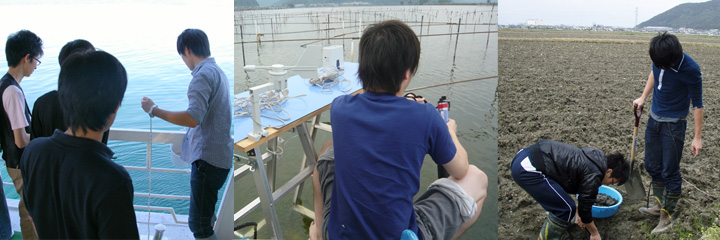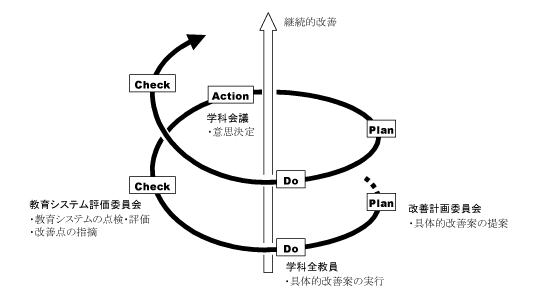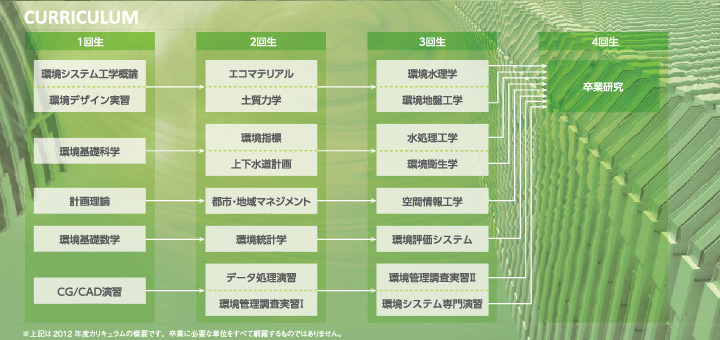Education Goals
- Provide training in the sciences to enable students to understand science and technology as well as history and culture as they relate to society.
- Foster academic abilities and information processing skills in the basic sciences of science and technology as well as information science.
- Facilitate acquisition of basic knowledge in a specialized field and the ability to independently solve problems.
- Foster the ability to understand the latest trends in science and technology and the communication skills to explain them.
- Cultivate the ability to analyze environmental problems, improve and manage environments, and create new environments.
- Provide training in economics in areas that overlap with environmental issues.

Improving Education

Improving Education
Department of Environmental Systems Engineering is continuously examining and improving its education system.
We repeatedly implement the Plan-Do-Check-Act cycle to create a system that allows students to learn more effectively.
Plan
The Program Improvement Committee devises specific policies for improving the education system. (Dept. Chair is the head of this committee)
Do
All professors in the department implement concrete plans on the improvements of the curriculum.
Check
About once a year, the Education System Evaluation Committee meets to evaluate and examine the education system from a more comprehensive perspective. (Seven external committee members are included)
Action
Action is taken by a departmental conference comprised of all the professors affiliated with the department. This is the body with ultimate decision-making authority regarding education system improvements.
We repeatedly implement the Plan-Do-Check-Act cycle to create a system that allows students to learn more effectively.
Plan
The Program Improvement Committee devises specific policies for improving the education system. (Dept. Chair is the head of this committee)
Do
All professors in the department implement concrete plans on the improvements of the curriculum.
Check
About once a year, the Education System Evaluation Committee meets to evaluate and examine the education system from a more comprehensive perspective. (Seven external committee members are included)
Action
Action is taken by a departmental conference comprised of all the professors affiliated with the department. This is the body with ultimate decision-making authority regarding education system improvements.
Progress Evaluation
| Methods and standards for evaluating students' learning and achievement of education goals | ||
| Learning and Education Goals | Evaluation Methods | Evaluation Standards |
| Provide training in the sciences to enable students to understand science and technology as well as history and culture as they relate to society. | Confirm units completed at graduation | Completes the minimum specified number of units (30) of basic courses. |
| Foster academic abilities and information processing skills in the basic sciences of science and technology as well as information science. | Confirm units completed at graduation | Completes the minimum specified number of units (26) of basic specialized courses and three units or more in an applied math course. |
| Facilitate acquisition of basic knowledge in a specialized field and the ability to independently solve problems. | Confirm units completed at advancement to senior status or higher | Fulfills the qualifications for starting their thesis research (completion of the minimum 100 units needed to graduate) when advancing to senior status or higher. |
| Foster the ability to understand the latest trends in science and technology and to develop the communication skills to explain them | Confirm units completed at graduation | Completes 10 or more units in a language, two or more units in a practicum course, and four units of thesis research. |
| Cultivate the ability to analyze environmental problems, improve and manage environments, and create new environments. | Confirm units completed at graduation | Completes 68 or more units of specialized courses. |
| Provide training in economics in areas that overlap with environmental issues. | Confirm units completed at graduation | Completes 10 or more units of Institute basic courses and 12 or more units of Institute specialized courses. |





